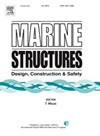大型互联箱型浮桥式海上浮动光伏阵列的动力学特性研究
IF 5.1
2区 工程技术
Q1 ENGINEERING, CIVIL
引用次数: 0
摘要
本文研究了一个边长160 m的5MW箱形浮桥式互联海上浮动光伏(OFPV)方形平台。解决了箱式浮筒式OFPV平台设计中的两个主要问题,即在特定波长范围内的最佳模块化单元尺寸(铰链配置),以及在什么条件下可以对结构进行刚性处理以降低计算成本。为了解决第一个问题,在研究了15种铰链结构的水弹性后,提出了位移类型。所选择的铰构型应使结构处于合适的位移类型,竖向位移相对较小,铰剪力较小。针对后一问题,对刚性模块单元的动力响应进行了计算和比较,结果表明,除非箱形浮桥式OFPV具有不切实际的大弹性模量,否则不能简化为刚体。然后提出广义刚性状态来说明临界弹性模量值,表明一旦结构的弹性模量超过该值,水弹性将趋于稳定而不是增加。本文章由计算机程序翻译,如有差异,请以英文原文为准。
Eliciting dynamic features of a large interconnected box-pontoon-type offshore floating photovoltaic array
This paper investigates a 5MW box-pontoon-type interconnected Offshore Floating Photovoltaic (OFPV) square platform with a side length of 160 m. Two primary problems in designing the box-pontoon-type OFPV platform are addressed, that is, the optimal modular unit size (hinge configurations) within specific wavelength range, and under what conditions can the structure be treated rigid to mitigate computational cost. To deal with the first issue, the displacement type is proposed after investigations into hydroelasticity of fifteen hinge configurations. The selected hinge configurations should put the structure in proper displacement type with relatively small vertical displacement and mild hinge shear force. To deal with the latter issue, dynamic responses of rigid modular units are calculated and compared, which indicate the box-pontoon-type OFPV cannot be simplified as rigid bodies unless it has an unrealistic large elastic modulus. The genralized rigid state is then proposed to illustrate a critical elastic modulus value, which shows that hydroelasticity will stablize instead of increasing once the structure’s elastic modulus exceeds this value.
求助全文
通过发布文献求助,成功后即可免费获取论文全文。
去求助
来源期刊

Marine Structures
工程技术-工程:海洋
CiteScore
8.70
自引率
7.70%
发文量
157
审稿时长
6.4 months
期刊介绍:
This journal aims to provide a medium for presentation and discussion of the latest developments in research, design, fabrication and in-service experience relating to marine structures, i.e., all structures of steel, concrete, light alloy or composite construction having an interface with the sea, including ships, fixed and mobile offshore platforms, submarine and submersibles, pipelines, subsea systems for shallow and deep ocean operations and coastal structures such as piers.
 求助内容:
求助内容: 应助结果提醒方式:
应助结果提醒方式:


